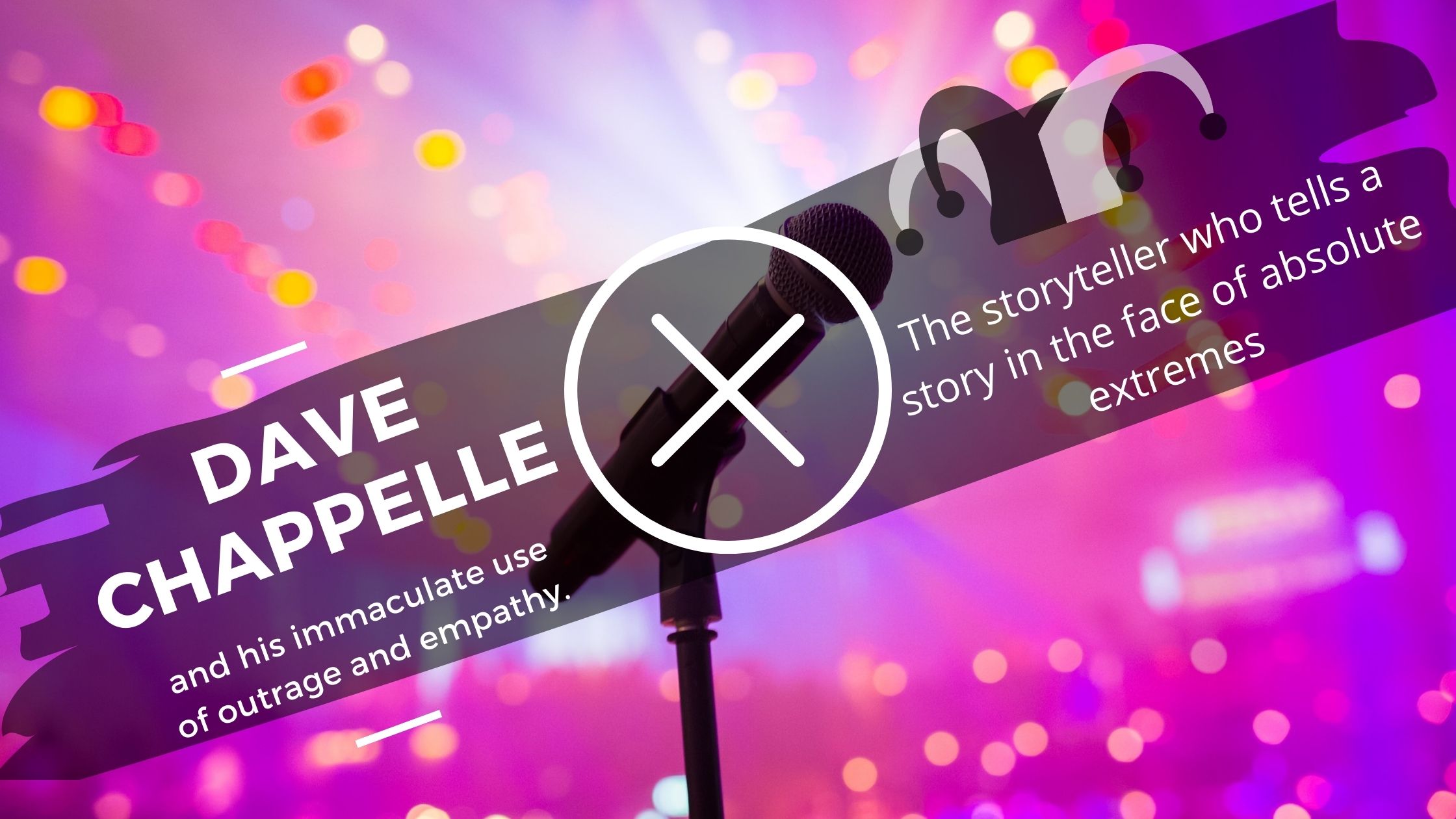This is the tale of a human storyteller. A new Dave Chappelle special has dropped on Netflix and the twitterati are buzzing with outrage. Some want him cancelled. Some want the critics cancelled. The rest are busy living normal lives. Everyone knows about ‘The Closer’. As always, the arrow hit its target and as an artist working among an increasingly fragile audience, this one was magnificent. Dave Chappelle is a genius. Whether you like him or not (on account of his comedy and/or opinions), there is no denying the genius of this comic. He jokes about everyone and everything. To quote everyone, “Nobody is safe!”
What do people really expect when they go to a Chappelle show I wondered? I think I have an answer. Stories. People go for the story. Chappelle recites jokes but what he does so well is storytelling. He talks to his audience, even the ones watching on Netflix. He draws us in with a cult leader-esque persona. Chappelle talks softly, then screams, dances, and sings. He doesn’t force the audience to listen – he makes them want to listen. Like a skilled magician who changes cards with a sleight of hand, Chappelle uses storytelling to do the same with his audience’s thoughts.
Familiarity
He sings familiar songs or mutters popular catchphrases before he cracks the tough-to-digest jokes to engage the audience and ease them into the painful yet hard-hitting premise of the joke. These jokes are the pointers leading to a social premise.
Relatability
He talks about someone he knows (from high school, within his personal circle of friends and family, at the comedy store, from some random bar on the road, et cetera). He does this to draw the audience into his life, making them feel as if they are one of his people. People like to belong in a tribe (especially when it is the tribe of someone famous). He makes use of relatable tropes to bond with his audience. This conditioning makes the blow from the premise softer when it comes.
Surprise
He uses the gift of ambiguity. Using reflective humour, Chappelle introduces the main premise of his special (which is often a social issue relating to race). He dodges the issue (mostly) by making things about himself (and not the issue per se). There is a shock value to his humour, a shock value that comes and slaps you in the face. These hard-hitting jokes encourage the audience to be human, even in the face of inhuman behaviour.
The Format
Chappelle says whatever he wants to say while saying he can’t say this out loud (making the appearance of the outrage around his humour and the cancel culture mob seem prophetic). He connects the outrage with empathy conveying the message of humanity to most people (who watch the whole thing). If you skim and scan though, you will only experience the outrage, you won’t notice the empathy, and the humanity of it all will be lost on you. If you watch a little clip, you will be triggered because the language he uses is fiery, sometimes incendiary.
Do you remember the jesters from a King’s Court from back in the day? Their job was to act silly, crack jokes and poke fun at the powerful people present in the court. Since time immemorial, comedians have been allowed to discuss and joke about subjects that are (morally) wrong and/or (socially) risqué in order to focus on the greater truths (whatever those are). Now though, comedians cannot say certain things. People pay money, go to shows or click on the shows and then, they call for it to be cancelled just because they didn’t like what they heard/saw.
To quote Chappelle himself,
“I don’t have to agree with all the art I consume, but it helps me understand how I actually feel about it.”
He is honest in a way that could get the audience to turn on him in a single instance. If he doesn’t handle the premise properly, people would do more than just boo him off the stage. The genius of Chappelle lies here. He uses outrage and empathy to draw his audiences in and he reminds them of their humanity and the humanity of the fellow man – everyone loves to laugh, especially during inappropriate moments.
I say, we let him do it for as long as he wants to. I say, we encourage more artists to be brave rather than constricted by some random dos and don’ts list made by people who do nothing but complain all day. If he does get cancelled, I guess it would be alright. To quote Chappelle for the last time, “It’s okay! My career ended many years ago.”
With that concluding note, let the begging commence. Let me know what you thought about this piece. While you do that, click on my other stuff as well alongside signing up for my cutesy, nerdy newsletter.
The Writing Catalogue
All content on this website, including blog posts, writing samples, and service descriptions, is the intellectual property of Binati Sheth and is protected by copyright law. Do not quote, reproduce, copy, or republish any part of this content without prior written permission. Unauthorized use is strictly prohibited and may result in legal action. For permissions or inquiries, please contact: [email protected]


Leave a Reply